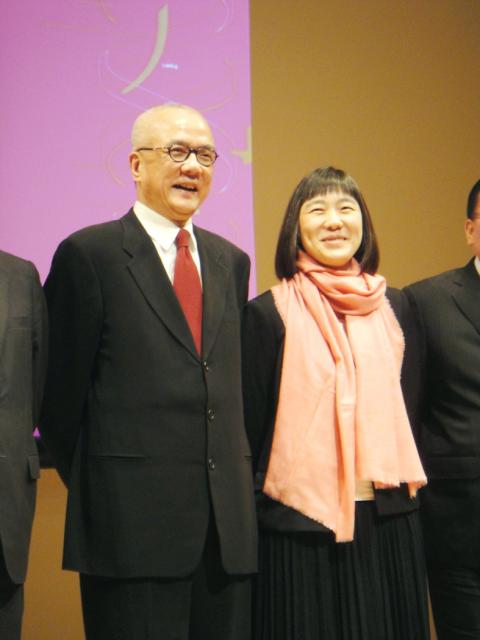Eslite Group (誠品集團) aims to increase group revenue by between 10 percent and 15 percent over the next five years on the back of planned expansion in Taiwan, China and Hong Kong, chairman Robert Wu (吳清友) said yesterday.
The group, which runs bookstores, galleries and department stores, reported a consolidated revenue of NT$13 billion (US$427.98 million) for last year.
Sales for this year could break the NT$14 billion mark, Wu told a media briefing in Taipei after celebrating the group’s 25th anniversary.

Photo: Chang Hui-wen, Taipei Times
The group is set to open its first boutique hotel, with 104 rooms, in Taipei’s Songshan Cultural and Creative Park in the second quarter, and plans to launch its first two department stores in China in the second quarter next year, in Suzhou and Shanghai.
“The outlet in Suzhou may be a department store as large as the company’s flagship outlet in Taipei’s Xinyi District (信義),” said Eslite Spectrum Corp (誠品生活) president Mercy Wu (吳旻潔), who is also vice chairwoman of the Eslite Group and Robert Wu’s daughter.
Eslite Spectrum operates department stores and restaurants. The subsidiary also plays an important role in the group’s overall growth and business strategy.
In the long term, the group plans to launch two or three outlets per year in Taiwan and at least one store in an overseas market, most likely in China and Hong Kong, she said.
The group is also eyeing opportunities to operate and manage a city-level cultural complex in China, she added.
Eslite Spectrum reported consolidated sales in the first two months of the year of NT$587.63 million, up 7.83 percent from a year earlier. Its overall revenue for last year stood at NT$3.44 billion, up 15.26 percent from 2012.
The company posted a net profit of NT$234.14 million, or NT$5.24 per share, for the first nine months last year, up from a net income of NT$157.77 million, or NT$3.85 per share, recorded a year earlier.

China has claimed a breakthrough in developing homegrown chipmaking equipment, an important step in overcoming US sanctions designed to thwart Beijing’s semiconductor goals. State-linked organizations are advised to use a new laser-based immersion lithography machine with a resolution of 65 nanometers or better, the Chinese Ministry of Industry and Information Technology (MIIT) said in an announcement this month. Although the note does not specify the supplier, the spec marks a significant step up from the previous most advanced indigenous equipment — developed by Shanghai Micro Electronics Equipment Group Co (SMEE, 上海微電子) — which stood at about 90 nanometers. MIIT’s claimed advances last

Taiwan Semiconductor Manufacturing Co (TSMC, 台積電) has appointed Rose Castanares, executive vice president of TSMC Arizona, as president of the subsidiary, which is responsible for carrying out massive investments by the Taiwanese tech giant in the US state, the company said in a statement yesterday. Castanares will succeed Brian Harrison as president of the Arizona subsidiary on Oct. 1 after the incumbent president steps down from the position with a transfer to the Arizona CEO office to serve as an advisor to TSMC Arizona’s chairman, the statement said. According to TSMC, Harrison is scheduled to retire on Dec. 31. Castanares joined TSMC in

EUROPE ON HOLD: Among a flurry of announcements, Intel said it would postpone new factories in Germany and Poland, but remains committed to its US expansion Intel Corp chief executive officer Pat Gelsinger has landed Amazon.com Inc’s Amazon Web Services (AWS) as a customer for the company’s manufacturing business, potentially bringing work to new plants under construction in the US and boosting his efforts to turn around the embattled chipmaker. Intel and AWS are to coinvest in a custom semiconductor for artificial intelligence computing — what is known as a fabric chip — in a “multiyear, multibillion-dollar framework,” Intel said in a statement on Monday. The work would rely on Intel’s 18A process, an advanced chipmaking technology. Intel shares rose more than 8 percent in late trading after the

FACTORY SHIFT: While Taiwan produces most of the world’s AI servers, firms are under pressure to move manufacturing amid geopolitical tensions Lenovo Group Ltd (聯想) started building artificial intelligence (AI) servers in India’s south, the latest boon for the rapidly growing country’s push to become a high-tech powerhouse. The company yesterday said it has started making the large, powerful computers in Pondicherry, southeastern India, moving beyond products such as laptops and smartphones. The Chinese company would also build out its facilities in the Bangalore region, including a research lab with a focus on AI. Lenovo’s plans mark another win for Indian Prime Minister Narendra Modi, who tries to attract more technology investment into the country. While India’s tense relationship with China has suffered setbacks